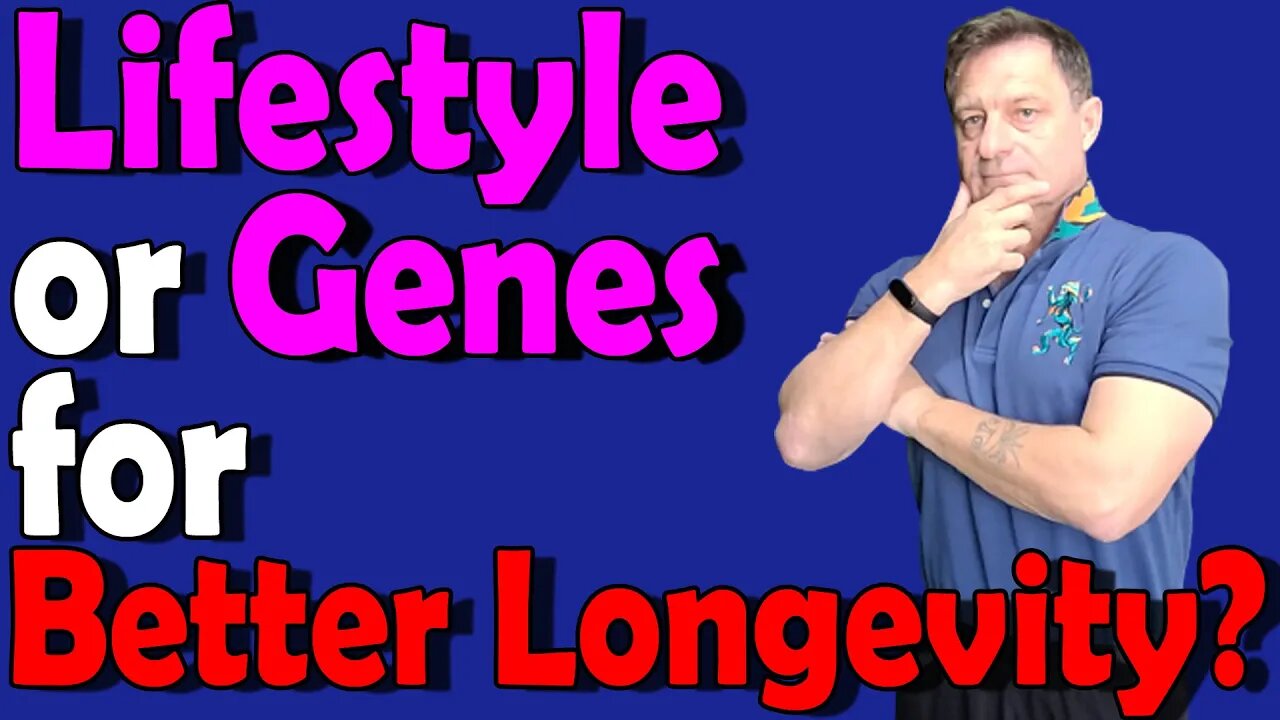Premium Only Content

New Research: Age or Genetics | Which is MORE IMPORTANT for determining HOW WE AGE?
How do our genes affect the way in which we age and impact on our lifespan? And can our lifestyle, the way and place we live, affect that to any great deal? A new study out of the University of California has shed some light onto those two questions.
DoNotAge.org 10% Discount Code: MYNMN (https://bit.ly/2VBDgNt)
Renue by Science 10% Discount Code: MYNMN (https://renuebyscience.com/?rfsn=5692699.331801&coupon-code=MYNMN)
Renue by Science 15% Subscription Service Discount Code: MYNMNSUB
I hope you enjoy my content and find it interesting or informative, if so, please consider supporting the channel by using one of the links below:
*Buy me a Kofi: https://ko-fi.com/mynmnexperiment
*Patreon: https://bit.ly/3hhfjl5
*SubscribeStar: https://bit.ly/3psYo23
My Current Anti-Aging Protocol:
• 1.5 grams of NMN (https://bit.ly/3c2Fxt8)
• 1.5 grams of Trans-resveratrol (Tue, Thu & Sat) (https://bit.ly/3yxeqy2)
• 500mg Metformin
• 1.5 grams of TMG (https://bit.ly/3oe1Ted)
• 5,000 IU (International Units) of vitamin D3 (https://bit.ly/3P32hYH)
• 120 mcg (micrograms) of vitamin K2 (Mk 7) (https://bit.ly/3PhkBgn)
• 250mg Magnesium (L-Threonate) (https://bit.ly/3O4pZ5o)
• 200mg high molecular weight hyaluronic acid (https://bit.ly/3P0Z4c2)
• 2,400mg of Fisetin, on the 1st, 2nd & 3rd of each month (https://bit.ly/3P2rSB0)
• 2,400mg of Quercetin, on the 1st, 2nd & 3rd of each month (https://bit.ly/3IzulAy)
• 81mg of aspirin (https://bit.ly/3uFjtem)
• 600mg DIM
There has been, of late, much speculation and indeed research about how our genetics affect the way we age, but now a University of California Berkeley study shows that individual differences in our DNA matter less and less as we get older, and become more prone to the diseases of aging, such as diabetes and cancer. In a study of the relative effects of genetics, aging and the environment on how some 20,000 human genes are expressed - the researchers found that aging and environment are far more important than genetic variation in affecting the expression profiles of many of our genes as we get older.
The level at which genes are expressed, that is ratcheted up or down in activity, determines everything from our hormone levels and metabolism, to the mobilization of the enzymes that repair the body.
Assistant professor Peter Sudmant of UC Berkeley said "How do your genetics - what you got from your sperm donor and your egg donor and your evolutionary history - influence who you are, your phenotype, such as your height, your weight, whether or not you have heart disease?
There's been a huge amount of work done in human genetics to understand how genes are turned on and off by human genetic variation.
Our project came about by asking, 'How is that influenced by an individual's age?' And the first result we found was that your genetics actually matter less the older you get."
So, while our individual genetic makeup can help predict gene expression when we are younger, it is less useful in predicting which genes are ramped up or down as we get older.
In this study, identical twins, for example, have the same set of genes, but as they age, their gene expression profiles diverge, meaning that twins can age far differently.
The findings have implications for efforts to correlate diseases of aging with genetic variation in humans.
Sudmant said. “Such studies should perhaps focus less on genetic variants that impact gene expression when pursuing drug targets.”
Professor Sudmant went on to say "Almost all human common diseases are diseases of aging: Alzheimer's, cancers, heart disease and diabetes. All of these diseases increase their prevalence with age. Massive amounts of public resources have gone into identifying genetic variants that predispose you to these diseases. What our study is showing is that, well, actually, as you get older, genes kind of matter less for your gene expression. And so, perhaps, we need to be mindful of that when we're trying to identify the causes of these diseases of aging."
These findings are in line with Medawar's hypothesis: Genes that are turned on when we are young are more constrained by evolution because they are critical to making sure we survive to reproduce, while genes expressed after we reach reproductive age are under less evolutionary pressure.
DISCLAIMER: This video and description contain discount codes, which means that if you use the code, I will receive a small commission.
FAIR-USE COPYRIGHT DISCLAIMER
Copyright Disclaimer Under Section 107 of the Copyright Act 1976, allowance is made for "fair use" for purposes such as criticism, commenting, news reporting, teaching, scholarship, and research. Fair use is a use permitted by copyright statute that might otherwise be infringing. Non-profit, educational, or personal use tips the balance in favor of fair use. #Epigenetics #EpigeneticAge #PhenotypicAge
-
 12:32
12:32
My Longevity Experiment
8 months ago $0.09 earnedI’m 60, Here’s Why I Now Avoid PEOPLE
1702 -
 LIVE
LIVE
Drew Hernandez
19 hours agoCANDACE OWENS ACCEPTS TPUSA INVITATION TO DISCUSS SUSPICION BEHIND CHARLIE KIRK ASSASSINATION?!
692 watching -
 LIVE
LIVE
TimcastIRL
2 hours agoDrunk Raccoon Becomes Top US Story After Getting Plastered, Passing Out In Bathroom | Timcast IRL
13,679 watching -
 LIVE
LIVE
SpartakusLIVE
5 hours agoRule #1 - The BEST Loot is ALWAYS in the OTHER GUY'S BAG
730 watching -
 LIVE
LIVE
ThatStarWarsGirl
2 hours agoTSWG LIVE: CHRISTMAS IS COMING! Stargate's BACK & DC is Doomed?!
129 watching -
 LIVE
LIVE
I_Came_With_Fire_Podcast
9 hours agoDid Pete Hegseth Commit WAR CRIMES | No more INCOME TAX | More Fraud in Minnesota W/ Mike Caldarisie
126 watching -
 LIVE
LIVE
Adam Does Movies
4 hours agoTalking Movies + Ask Me Anything - LIVE
38 watching -

TheSaltyCracker
2 hours agoWar Crimes ReeEEStream 12-03-25
36.5K96 -
 1:31:59
1:31:59
Glenn Greenwald
4 hours agoTrump Administration Claims to Save Hundreds of Millions of Lives by Blowing Up Drug Boats; Ethan Klein's Unhinged Vengeance & Lawsuits Against Other YouTubers: With Taylor Lorenz | SYSTEM UPDATE #553
82.3K95 -
 19:14
19:14
MetatronCore
19 hours agoHow Propaganda works on your Brain
1.12K2